Scuttlebutt has it that the new legislature is preparing a proposal to drastically increase beer taxes in Oregon. Among the legislators pushing the new tax is my own state representative and neighbor, Jackie Dingfelder. Exactly what will be proposed is still uncertain, and there are apparently several alternatives and provisions being considered. What is certain, however, is that Oregon beer producers and consumers are extremely unhappy about it.
What’s driving the desire to tap beer as a new revenue source is twofold. First, legislators feel pushed around a bit by the beer and wine distributors lobby. After the mini-scandal involving all-expense-paid junkets last session, more than a few legislators want to “get back” at the lobbyists who walked away unscathed while elected officials took a beating in the press, and for some, in the polls.
Second, throw in a new activist majority, hungry after 16 years out of power and needing money to finance it, and you have yourself what legislators might call a “taxable opportunity.”
The proposals, it seems, have a few things in common. One, it would raise the beer excise tax from $2.60/BBL to around $34/BBL, a 13-fold increase. Two, it would exempt smaller brewers; specifics vary, but the number 200,000 BBL/year is being bandied about. Three, the proposals target only beer – not wine or spirits. The money, it is claimed, would be used to pay for drug rehabilitation and treatment programs.
The size of the increase is remarkable, to put it mildly. Oregon, now fourth-lowest in beer taxes in the US, would zoom to the very highest, beating Alaska by 4 cents per gallon. A state that has gained a strong reputation for great beer by nurturing the industry with relatively low tax rates would, in one fell swoop, turn into one that punishes one of its famed boutique industries.
Compare beer to the other alcohols and the change is even more amazing. Borrowing calculations posted by Mark Wilson on the Oregon Brew Crew listserve, on a per-glass basis, wine is taxed at 3 times the rate of beer (2.6 cents vs. 0.8). Under the new rate, beer would be taxed 10.4 cents per glass, over four times the rate of wine. Spirits, at 8.75 cents per glass, would ironically become a relatively “cheap” drink, tax-wise.
Which brings up where the money would go. While it can conceptually be targeted to pay for a given program, the legislature is not legally bound by that promise. The revenues actually accrue to the state’s general fund, of which about $10 million – out of a total of over $12 billion per biennium - goes to drug treatment and rehab right now. Schools absorb 54%, health and human services programs 23% (including drug programs) and state police another 16%. So where the dollars actually will go is not all that terribly clear.
The impact on the price of beer is also unclear, except, in general, it will go up. The hyperbole from fear-mongers has it pushing craft six-packs over $10. I paid $8 for a winter seasonal recently, so we’re probably not far from that anyway. But my calculations show a $1.03 per gallon increase only netting about 65 cents on a 72-oz. six-pack. Of course, it’s an excise tax, which means it’s on production rather than sales, but unless someone’s doing some serious gouging (more on that later), the increase ought to stay at a still-unwelcome buck-a-six.
The impact on the industry, however, is more clear. Only two breweries in the state – Widmer and Portland/Pyramid – exceed the 200K threshold. Deschutes is close and Full Sail is on its way – unless this tax takes effect. If these brewers have to pay $31 more for each barrel, the 200,001st one is going to cost them an extra $6.2 million. Guess who’ll stop growing real soon?
Pyramid already owns production facilities in Washington and could easily move. Widmer would have a bigger problem but would have to consider it, for that kind of money.
So the current proposal, such as it is, is seriously flawed. The question is – accepting for the moment that some sort of tax is on the table – what is reasonable?
At first blush, one might propose a simple solution: bring the beer tax up to the same level as wine. The problem is, that doesn’t raise a heck of a lot of money. According to the Oregon Brewers Guild, Oregon produces about 683,000 barrels per year. Even if you tax every barrel, five bucks more a barrel yields only about $3.5 million, vs. the $21 million that a $31 increase would bring. Legislators only have so many bullets in their tax guns; they need to raise serious bucks with each one. No matter how small an increase, every tax bite ticks somebody off. Raising rates to collect pennies isn’t worth the paperwork.
Eliminating the 200,000 BBL threshold would boost revenue, but hurt the smallest, most entrepreneurial breweries the most. Already on the margin and much more fleet of foot, we wouldn’t see them hang around much longer, either. And forget about starting up new ones here. Vancouver is just too close by to pass up.
A third option might be to bring beer and wine into line with the taxes on spirits, now about 10 times that of beer. But for the brewers, that increase is still too large.
The irony of all this is that a big beer tax increase would benefit most the group that the legislators purportedly want to punish most. Distributors’ profits would increase, as they mark up their product based on the price they receive from the brewery. Interestingly, they’re staying quite mum on this debate.
The real answer is much harder. Oregon needs to revisit its tax structure, top to bottom. Its high and peculiar income tax, the lack of sales tax and its convolutedly high but constitutionally limited property tax rates distort the economy in odd ways and leave legislators few and awkward tools to use then seeking new revenues for needed services.
A quick fix isn’t going to happen. And even if it were, the beer tax ain’t it.
Sunday, December 17, 2006
Tuesday, December 05, 2006
Brewing: A photo essay
Friends often ask me if they can "come over and watch me brew" some time. I try to explain, that's like asking if you can come over and watch me mop the floors or something; it's really not very interesting to watch, although it can be a lot of fun to do it with someone.
Recently as I brewed I thought I'd document the process for those who are curious how this alchemic little process works - the conversion of water, barley malt, hops and yeast into, aaahhh, beer.
Recipe of the day: "Hallucinator" Old Ale. A Collaborator winner in 1999, served in Portland pubs in 2000 and the Brewer's Festival in 2001, and People's Choice at the 2001 Winter Beer Festival. 7.2 percent alcohol but tastes so smooth you can't tell you're getting snockered.
First, you have to crack the grains in a mill:
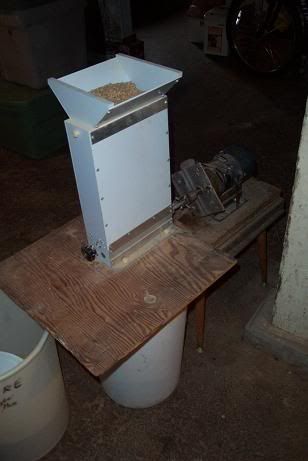
Mine is motorized; most homebrewers' mills, if they own one (and most don't) are hand-operated, but I'm both industrious in my love of automation and lazy when it comes to physical labor. (Note: this brew occurred before my recent upgrade to mount the mill on a permanent table, which makes it MUCH easier yet.)
After the grain is cracked it goes into the mash tun. Mine is a picnic cooler fitted with a slotted copper pipe manifold. Another aspect of the hobby that took me hours to make!
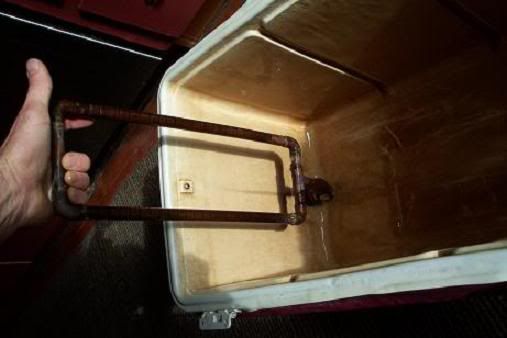
Meanwhile, heat up the water. This is my "hot liquor tank," which is heated by a blowtorch-style propane burner. Notice the thermometer hanging out front. That came from a discarded dishwasher:
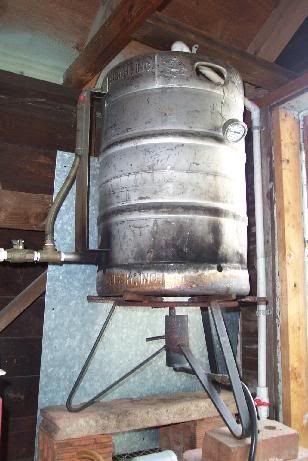
When the water's hot enough (about 165-170F) it goes into the mash tun with the grain, and now we have a mash:

After that, we wait a while... about an hour to 90 minutes. Then I pump the sweet liquid from the mash (called wort) through a heat exchanger sitting in boiling water. Most homebrewers who brew "from scratch" like me don't bother with this; they just add boiling water to raise the temperature. Pshaw! Why do that when you can use gadgets? So... here's mine. At the heart of my system - the pump:
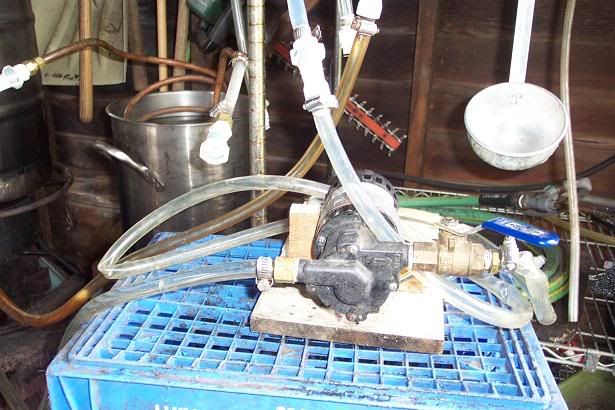
Then we rinse the grain with more hot water... which involves even more copper pipes, this time drilled with little holes to let the water gently sprinkle over it:
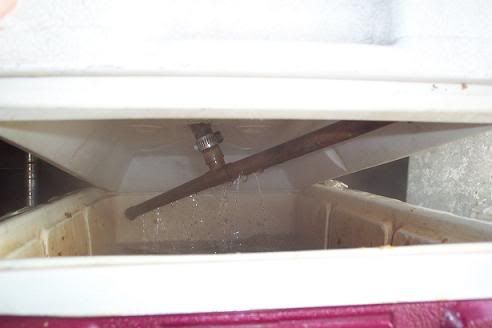
Meanwhile the wort is drained out the bottom into the kettle.
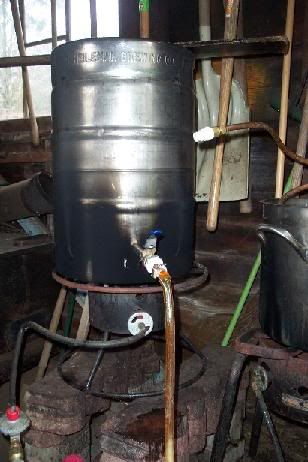
I like to "first wort hop," meaning I put hops in the kettle before the first wort goes in. That gives a hoppier flavor without adding bitterness, which is important for this type of beer.
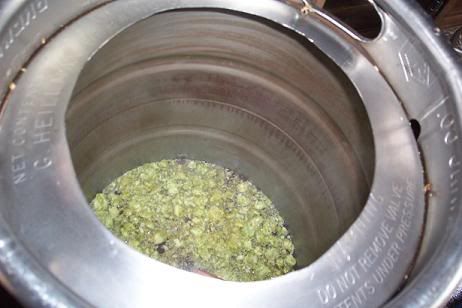
Once all the wort is in the kettle, it's boiled for 90 minutes, with more hops added along the way. This style doesn't get too heavily hopped. Once the boil is done, the wort needs to be chilled. Naturally, time for more gadgets... the wort chiller - again homemade:

There's a 1/2" OD copper tube inside that hose that the beer runs through, and water flows outside of it in the opposite direction. Cold water and hot beer in; cool beer and warm water out, into the carboy for fermentation:
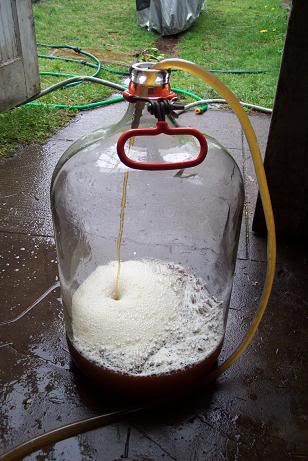
Then, to feed the yeast, I add oxygen.
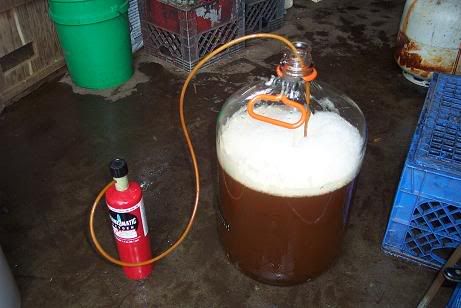
Then and only then do we add the real workhorse of the entire process: billions and billions of tiny yeast cells. The amount I pitched is hundreds of times what many homebrewers use, because I harvested yeast from a batch I bottled yesterday, which I'd harvested from a previous batch, and yeasties reproduce like single-celled rabbits in wort. Everything below the black line (yesterday's porter) is yeast.

Then the beer goes into the cellar for a week or two to ferment, after which I will keg and bottle it. If there's interest, I'll post a follow-up about that.
Recently as I brewed I thought I'd document the process for those who are curious how this alchemic little process works - the conversion of water, barley malt, hops and yeast into, aaahhh, beer.
Recipe of the day: "Hallucinator" Old Ale. A Collaborator winner in 1999, served in Portland pubs in 2000 and the Brewer's Festival in 2001, and People's Choice at the 2001 Winter Beer Festival. 7.2 percent alcohol but tastes so smooth you can't tell you're getting snockered.
First, you have to crack the grains in a mill:

Mine is motorized; most homebrewers' mills, if they own one (and most don't) are hand-operated, but I'm both industrious in my love of automation and lazy when it comes to physical labor. (Note: this brew occurred before my recent upgrade to mount the mill on a permanent table, which makes it MUCH easier yet.)
After the grain is cracked it goes into the mash tun. Mine is a picnic cooler fitted with a slotted copper pipe manifold. Another aspect of the hobby that took me hours to make!

Meanwhile, heat up the water. This is my "hot liquor tank," which is heated by a blowtorch-style propane burner. Notice the thermometer hanging out front. That came from a discarded dishwasher:

When the water's hot enough (about 165-170F) it goes into the mash tun with the grain, and now we have a mash:

After that, we wait a while... about an hour to 90 minutes. Then I pump the sweet liquid from the mash (called wort) through a heat exchanger sitting in boiling water. Most homebrewers who brew "from scratch" like me don't bother with this; they just add boiling water to raise the temperature. Pshaw! Why do that when you can use gadgets? So... here's mine. At the heart of my system - the pump:

Then we rinse the grain with more hot water... which involves even more copper pipes, this time drilled with little holes to let the water gently sprinkle over it:

Meanwhile the wort is drained out the bottom into the kettle.

I like to "first wort hop," meaning I put hops in the kettle before the first wort goes in. That gives a hoppier flavor without adding bitterness, which is important for this type of beer.

Once all the wort is in the kettle, it's boiled for 90 minutes, with more hops added along the way. This style doesn't get too heavily hopped. Once the boil is done, the wort needs to be chilled. Naturally, time for more gadgets... the wort chiller - again homemade:

There's a 1/2" OD copper tube inside that hose that the beer runs through, and water flows outside of it in the opposite direction. Cold water and hot beer in; cool beer and warm water out, into the carboy for fermentation:

Then, to feed the yeast, I add oxygen.

Then and only then do we add the real workhorse of the entire process: billions and billions of tiny yeast cells. The amount I pitched is hundreds of times what many homebrewers use, because I harvested yeast from a batch I bottled yesterday, which I'd harvested from a previous batch, and yeasties reproduce like single-celled rabbits in wort. Everything below the black line (yesterday's porter) is yeast.

Then the beer goes into the cellar for a week or two to ferment, after which I will keg and bottle it. If there's interest, I'll post a follow-up about that.
Subscribe to:
Posts (Atom)